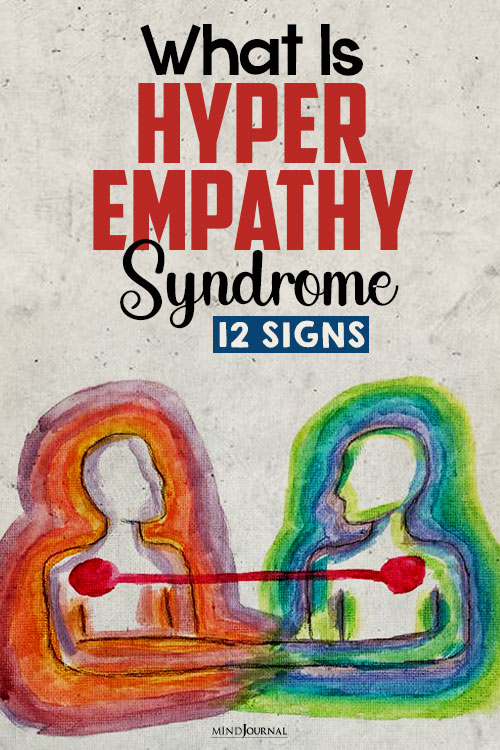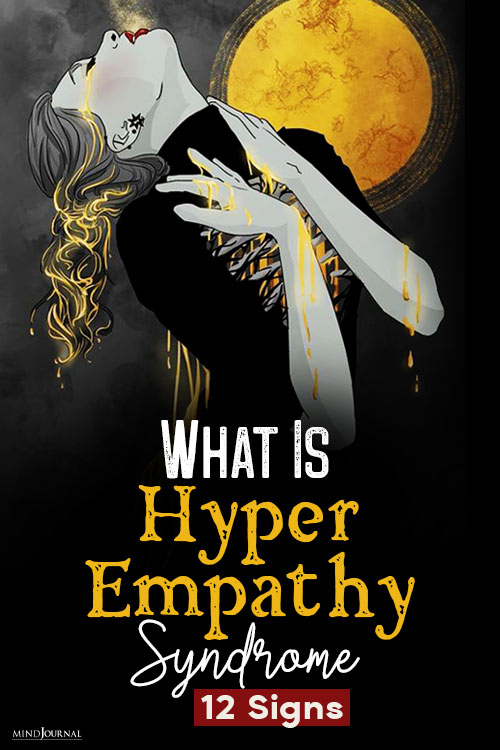Do you care excessively about others? Do you absorb others’ feelings & pain? Having empathy and being sensitive is crucial for connecting with others. But too much of it can make you feel overwhelmed, burdened and even guilty. Let us understand what is hyper empathy syndrome.
What is hyper empathy syndrome?
Empathy is an essential part of the human experience. It allows us to relate to others, feel and experience what they are going through and help them resolve their issues. However, when empathy for others engulfs our own needs and emotions, it can easily become hyper empathy syndrome.
People with such extreme high levels of empathy can not only get in tune with the feelings of others, but can feel their emotion as if it were their own.
To understand what is hyper empathy syndrome, we need to realize that this can cause emotional dysregulation making them drown in negative emotions. It can affect their sense of self leading to a painful mental and emotional experience. This syndrome can make you feel so sensitive that you may feel sad simply by seeing others in distress.
Hyper empathy is our inherent capacity to be in tune with others’ feelings which causes a sense of extreme alertness towards negative emotions. The condition became widely known and accepted after researchers reported that a woman developed the syndrome after resistive epilepsy surgery. It was found that after a section of her brain, including the amygdala, was removed to treat severe epilepsy, the patient started experiencing a “new, spectacular emotional arousal,” and above-average levels of empathy. Neurologist Dr. Aurélie Richard-Mornas, who initially reported the case, says that although epilepsy patients tend to experience mental health issues like anxiety and depression after surgery, “the case of this patient is surprising because her complaint is uncommon, and fascinating: hyper empathy.”
Read also: What Is Your Level of Empathy?
The psychology of hyper empathy
Before we can further delve into what is hyper empathy syndrome and how it can affect us, let us understand what empathy truly is. Empathy refers to our innate capability to feel or understand what another person is feeling or experiencing from their perspective. It means putting yourself in someone else’s metaphorical shoes.
According to a 2017 study, it “plays a critical interpersonal and societal role, enabling sharing of experiences, needs, and desires between individuals and providing an emotional bridge that promotes prosocial behavior.” Research also shows that empathy is a “powerful communication skill.” This “skill” enables us to build strong relationships by experiencing and sharing the emotions of another individual.
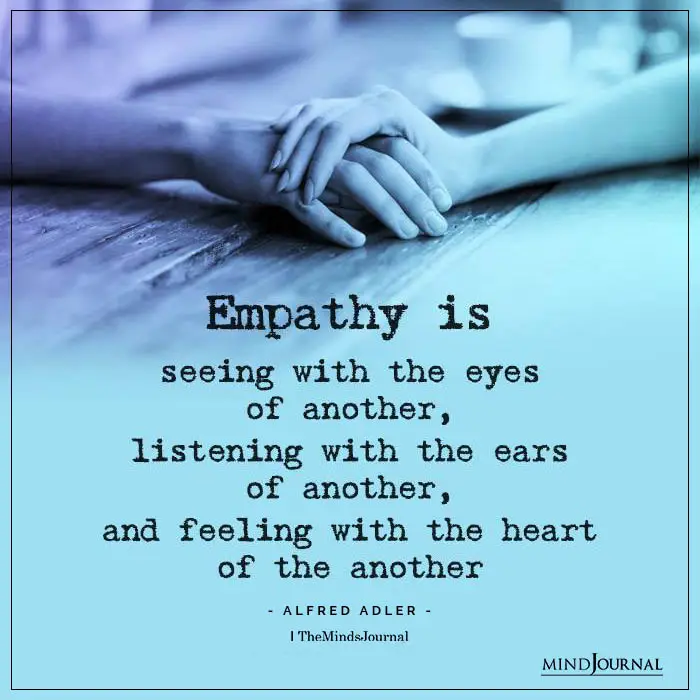
Psychologists believe that there are two primary types of empathy –
- Cognitive empathy: Our ability to understand someone’s mental and psychological state and observe things from their perspective.
- Affective empathy: Our ability to feel & experience someone’s emotions and show appropriate compassion.
To answer what is hyper empathy syndrome, we must emphasize that it emerges from affective or emotional empathy. When we put aside our own feelings and absorb someone else’s emotions without maintaining any protective boundaries, it can cause painfully elevated levels of empathy and compassion.
This extreme level of empathy is known as empathic reactivity, and is defined as “an index of how strongly one mirrors another emotion of any type,” by Stanford University School of Medicine’s Centre for Compassion and Altruism Research and Education. Individuals with hyper empathy syndrome are often identified as Highly Sensitive People or empaths.
Read also: The Science Behind Empathy And Empaths: 5 Interesting Facts
Signs of Hyper empathy syndrome
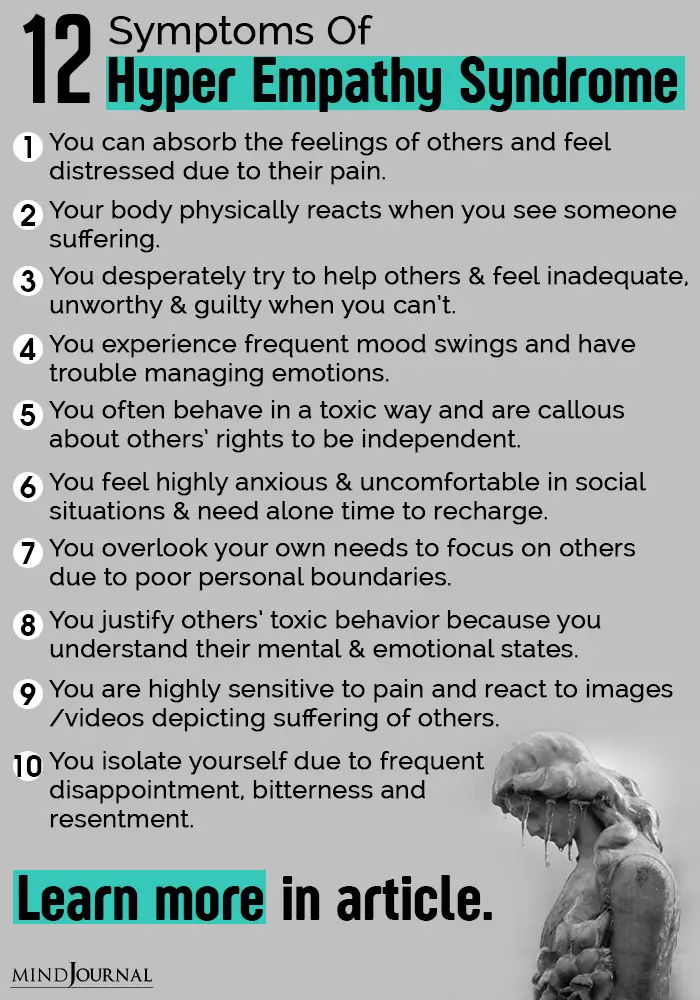
Wondering if you over-empathize with others? If you are having difficulty identifying empathic reactivity, then here are some common signs of hyper empathy syndrome and unhealthy, toxic hypersensitivity:
1. Absorb emotions
You instinctively devour other’s pain like a sponge when anyone shares their emotions with you. You carry the pain for a long time and feel distressed due to someone else’s pain.
2. Physical response to pain
You can feel so overwhelmed by others’ pain & emotions that you can have physical reactions, such as headaches, muscle pain, stomach pain etc.
3. Identity
You feel obsessed about helping the other person and feel uneasy & frustrated when you can’t relieve others’ pain. Being unable to resolve their problems affects your sense of self and makes you feel unworthy, empty, guilty and inadequate.
4. Mood swings
You have trouble with emotional regulation and experience severe stress & mood swings frequently, from ecstatic joy to depression.
5. Toxic behavior
Another factor that can help you understand what is hyper empathy syndrome is toxic behavior. Your toxic empathy often makes you extremely overprotective unnecessarily and blind towards the autonomy of the other individual.
6. Social anxiety
As you are highly sensitive, you feel overwhelmed in a social setting or when you’re around lots of people. Studies have found a relationship between high empathy levels and social anxiety. Social gatherings make you feel emotionally drained and exhausted afterward. You feel like you need some downtime to shake off all the emotions you have taken in from others.
Read also: 10 Signs You Have Above Average Empathy
7. Personal boundaries
You have poor personal boundaries. Hyper empathy prevents you from saying ‘no’ to others often at the cost of sidelining your one needs and desires.
8. Vulnerable to abuse
Being overly empathic, you allow others to mistreat or even abuse you as you feel bad for them. You justify their toxic behavior as you understand their mental & emotional states.
9. Pain sensitivity
One of the most common hyper empathy syndrome symptoms is your sensitivity towards pain. You often emotionally overreact to images or videos of someone suffering or being in pain. Research shows that individuals who are empaths tend to be more sensitive towards pain and suffering than people with low levels of empathy.
10. Resentment and isolation
Toxic empathy affects your own life and prevents you from investing time on yourself. You often feel resentment, bitterness, anger, and irritation due to frequent disappointment. This makes you prone to self-isolation.
11. Intuitive
You have a strong intuition and often follow your gut instinct to decipher what others are thinking or feeling. Studies have found that people with high levels of empathy tend to make decisions based on their intuition.
12. Codependent
Although hyper empathy and codependency are not directly related, highly sensitive people tend to have codependent traits as they put others’ needs before their own. In romantic relationships, you may be codependent and may fall for abusive, toxic narcissists. This is one of the hyper empathy symptoms that can help you figure out what is hyper empathy syndrome?
Can compassion cause emotional fatigue?

The syndrome may be associated with emotional contagion and empathic concern. Emotional contagion is a phenomenon where emotions of others can infect us like a contagious disease and trigger similar mental, emotional and even physical experiences.
Empathic concern refers to certain empathic and compassionate feelings that drive us to take action for the welfare of others, often at the cost of our own well-being. Such dangerous levels of empathy and compassion can make us suffer with the other person without having the ability to protect ourselves. W
hen we excessively worry about another person and do not possess the ability to cope with the psychological impact, we experience hyper empathy, also identified as compassion fatigue. Researchers explain that “Compassion fatigue (CF) is stress resulting from exposure to a traumatized individual.”
The term ‘Compassion fatigue’ was coined by psychologist Charles Figley during the 1980s when he experienced emotional exhaustion while helping patients cope with trauma. He observed that this phenomenon causes a strong need to help the other person find relief while being unable to feel relief yourself. It can also cause exhaustion, numbness, anxiety, and emptiness, and even cause burnout and depression in the long run. Although the concept is widely accepted in the field of psychology, it is not officially recognized as a diagnosis by the Diagnostic and Statistical Manual of Mental Disorders (DSM-5).
Read also: What Is Emotional Burnout And Ways To Replenish Your Energy
The cost of caring
No that we have some idea about what is hyper empathy syndrome, let us understand how much does so much empathy cost. During his research, Dr. Figley found that hyper empathy or compassion fatigue is the price we pay for caring about others. According to psychology professor Kerry Schwanz, the experience involves an element of burnout that causes stress to gradually worsen as we use our empathy and compassion excessively and incessantly. As you constantly absorb the pain, suffering, and stress of another person, it leads to empathy overload. Schwanz believes this can eventually cause a number of psychological problems, such as –
- Anxiety
- Depression
- Emotional exhaustion
- Low morale
- Depersonalization
- Hypervigilance
- Post-traumatic stress disorder (PTSD)
Hence, if you have this syndrome, then you may suffer due to someone else’s stress, pain, and trauma and not experience your own stress or trauma. Also identified as empathic reactivity, this signifies that excessive amounts of empathy can be detrimental for us.
Empathy allows us to feel the pain, distress, anger and anxiety of others emotionally and physically in our body. By letting these external emotions enter our body, we can make the mistake of allowing them to emotionally abduct our mind and body.
According to research, uncontrolled and unchecked empathy can elevate the levels of cortisol, the stress hormone, causing problems in expressing, identifying and regulating emotions.
The more you open yourself up to absorbing others emotions and experiences, the more vulnerable you will become to feelings of hopelessness, emptiness and depression. This can cause severe burnout and shatter the connection of trust we expected to build.

However, it’s not just you, excessive empathy can also affect the other person as well. No matter how pure your intentions are, thanks to your hyper empathy syndrome, your efforts to resolve the other person’s problems can create relationship issues, unless they are willing to accept your help.
Your drive and desire to help and ‘fix’ the person in need can make you blind to the fact that your behavior and actions may be seen as intrusive and forceful. It can make the person feel unworthy, useless, humiliated and disrespected. Your act of kindness and support can worsen their mental state.
Read also: How to Avoid the Empathy Trap
How hyper empathy develops
To gain a clearer idea about what is hyper empathy syndrome, we need to consider how it may develop. It is believed that empathy tends to develop during our early childhood and often toddlers exhibit complex empathic behaviors, like concern for the wellbeing of a parent, caregiver, sibling or even a pet. According to a research paper, “a multitude of studies have provided evidence that very young children are, in fact, capable of displaying a variety of rather sophisticated empathy related behaviors.” They can express “verbal and facial concern” and participate in different helping behaviors.
However, empathy is still a learned behavior, even though we may be born with this trait. Children often tend to learn empathic behavior from their parents by learning to identify emotional cues in their caregivers. But when a parent or a caregiver ignores the emotional needs of a child or neglects them, then it can distort their ability to empathize with others. Children who do not experience a secure attachment with their primary caregivers and are unable to form an intimate connection with their parents, can have an impaired sense of empathy.
When a child develops an avoidant attachment or anxious attachment pattern instead of a secure attachment with their parents, then, as adults, they may not possess the required emotion regulation abilities and become engrossed in another individual’s emotions. In the general sense, this is not considered as empathy.
One 2019 study found that the human ability to empathize is influenced by biological dispositions, caregiving patterns and experiences, reactive temperament & chronic adversity experienced during early developmental stages. It was even observed that stress, anxiety, and trauma experienced during childhood can lead to hyper empathy.
According to another 2018 study, childhood trauma can cause “an increase in trait empathy in adulthood.” It was found that trauma not only causes anxiety & fear about the future, it can also lead to elevated empathy levels and high sensitivity towards others’ suffering. The “findings suggest that the experience of a childhood trauma increases a person’s ability to take the perspective of another and to understand their mental and emotional states, and that this impact is long-standing,” explains the study. The researchers also found that the level of empathy positively correlated with the intensity of the trauma.
Read also: A Relationship Without Empathy
According to experts, genes and brain chemicals can also influence our empathic abilities. Brain chemicals can influence our attachment styles, relationships, mental health, long-term & short-term memory and even our learned and inherent fear.
Moreover, brain chemicals and deficits manage what level of empathy, conscience, compassion, and guilt we may have. To understand ‘what is hyper empathy syndrome’, we have to understand that hyperempathy is closely associated with our inherent personality and temperament, brain structure that manages empathy levels and genetic predispositions to empathy.
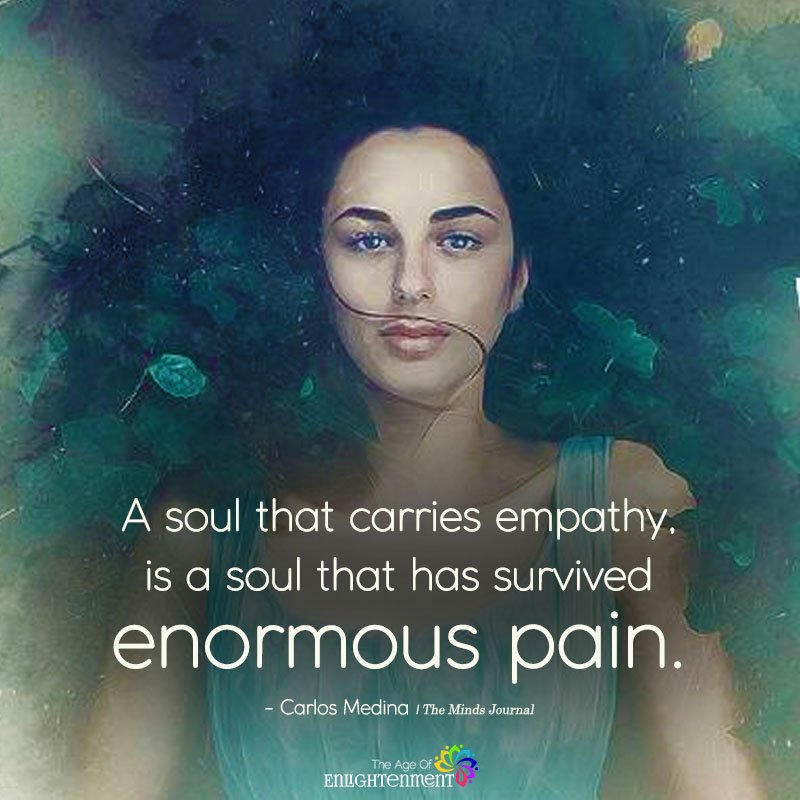
Hyper empathy & mental health
Experts believe that people who can feel high levels of empathy are more prone to suffer from mental health issues and psychiatric disorders. Researchers have found that individuals with hyper empathy and high sensitivity are at a higher risk of experiencing anxiety, interpersonal guilt, personal distress, anhedonia/misery symptoms, fear/arousal symptoms, and depression. This is because they are more likely to internalize the negative emotions of others. Empathy is an important interpersonal skill set, which “may also, paradoxically, confer risk for depression and anxiety when present at extreme levels and in combination with certain individual characteristics or within particular contexts,” explain the researchers.
Apart from these, exceptionally elevated levels of empathy can also lead to other mental health issues, such as –
- Insecure, anxious attachment
- Anxiety disorders such as social anxiety
- Codependency
- Unhealthy personal boundaries
- Lack of self-compassion and self-empathy
- Victim mentality
- Projection
- Borderline personality disorder (BPD)
Hyper empathy & personality disorders
So what is hyper empathy syndrome and how is it linked to our personality? According to an article, hyper empathy syndrome is identified as a trait of personality disorders and not as a separate diagnosis by the DSM-5. It is believed by experts that if any behavior pattern causes distress to an individual and affects their regular functioning, then it may require a medical diagnosis and treatment. For hyper empaths, their ability to constantly feel others’ pain leads to stress, frustration and general distress in their lives. Hence, abnormal degrees of empathy can be considered as a sign of personality disorder.
Read also: The Empathy Trap: Understanding The Sociopath-Empath-Apath Triad
Although a lack of empathy is associated with narcissistic personality disorder (NPD), psychopathy, and autism spectrum disorder (ASD), hyper empathy, particularly affective empathy, may be related to borderline personality disorder (BPD). According to a 2010 study, BPD and emotional hyper-reactivity are closely linked. The study states “The majority of empirical studies in this area have concluded that patients with borderline personality disorder are indeed hyper-responsive to experimental environmental stimuli, whether the stimuli are negative, positive, or even neutral or ambiguous.”
How you can deal with hyper empathy
Psychologists believe that people suffering from emotional contagion and empathic reactivity can follow certain coping techniques that can help them become more aware of their empathy in a non-judgmental way. These exercises can enable you to observe and better regulate your emotional reactions. When you realize that you are experiencing empathy overload, make sure to –
- Breathe and relax to let go of the physical, emotional and mental stress you are holding on to.
- Be mindful, “clear your mind of all thoughts,” and practice detachment from your emotions.
- Focus your attention on your breath and bring your awareness to “the center of your body just below your navel,” to have mental clarity.
- Practice affirmations and focus on certain power words that help you feel the desirable emotions.
When we become distracted by strong emotions, it is best to pause and breathe. However, if you are highly prone to suffering from empathy spectrum disorders, like hyper empathy syndrome, then here are some additional self-help strategies to help you overcome compassion fatigue:
1. Identify the signs
Learn to recognize the symptoms of excessive empathy when they start to manifest. Developing self-awareness can help you recognize certain signs like personal distress, guilt, intrusive thoughts, emotional exhaustion, dissatisfaction and depression.
Read also: How To Deal With Overwhelm As An Empath
2. Practice self care

According to the American Psychological Association (APA), when it comes to empathy, one must follow the basic tenet of flight attendants – “Put your own oxygen mask on before helping others,” explains psychologist Amy M. Williams, PhD. Following a healthy self-care routine will ensure that you have a balanced diet, get enough sleep, exercise regularly, socialize adequately and practice relaxation techniques. You can also take a day off from your normal, scheduled life and engage in any activity that makes you feel good and happy. It is also important that you learn to set strong boundaries and know when to say ‘no’.
3. Value compassion satisfaction
Compassion satisfaction refers to positive feelings related to helping others, such as pleasure, satisfaction, pride and happiness. By focusing on the smaller daily accomplishments instead of the lost battles, you will be better able to cope with compassion fatigue. Psychology professor Kerry Schwanz suggests “There can be terrible things going on, but focus on the wins.” Practicing gratitude is an excellent technique for experiencing compassion satisfaction and coping with hyper empathy.
4. Focus on self-compassion
Helping others is a noble act, but it should never come at the cost of your own well-being. Compassion is like charity, it always begins with yourself. So take time to reflect on your own needs, desires and thoughts and focus on fulfilling them. “You want to really respect the fact that you’re human, too,” adds the APA article.
Read also: Why Empathy Must Start With You
5. Seek help
If you think you are unable to manage your elevated empathy levels by yourself or if you are suffering from severe stress, anxiety, depression or any other underlying mental health issues, then it’s best to consult a mental health professional. Talking to a psychologist or a therapist can not only help you balance your emotions and empathy, it can empower you to better care about yourself as well.
Detach from hyper empathy
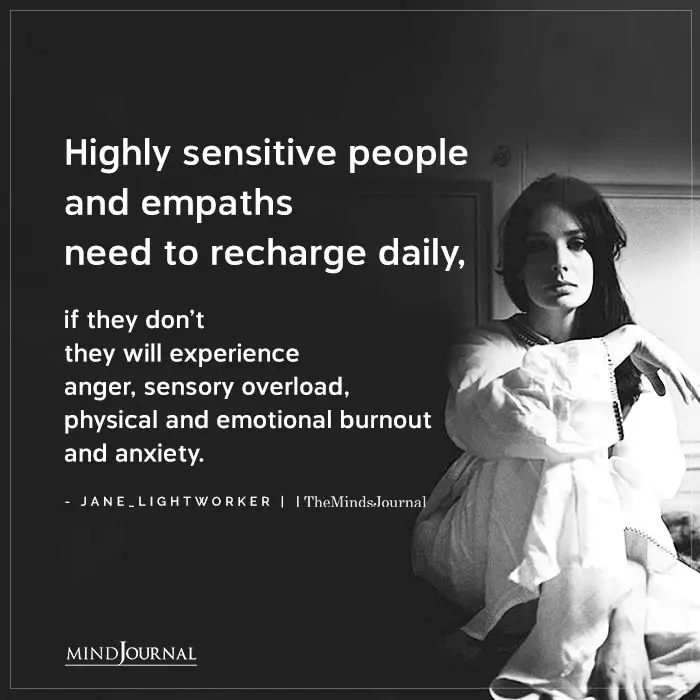
Once you have understood what is hyper empathy syndrome, you will realize that empathy is a vital human trait. However, just like everything else, excessive empathy can lead to some toxic habits and patterns of behavior that can affect your well-being. This is why it is crucial that you learn to detach yourself from negative emotions that aren’t even yours. This will help you practice healthy empathy and compassion enabling you to help others in need, while protecting your own emotions. It is only by releasing yourself from the burden of compassion fatigue that you can truly help others and build meaningful relationships.
So let go of others’ emotions & stress and focus on developing personal boundaries that will enable you to help others and yourself.
Read also: If You Want An Intense Kind Of Relationship, Date A Girl With Hyper-Empathy
Frequently Asked Questions (FAQs):
How do you treat hyper empathy?
There is no specific cure for hyper empathy syndrome. However, you can learn to manage your symptoms by consulting a psychologist or a therapist. You can be more self-aware, build strong boundaries and learn to let go of difficult emotions.
How do you control hyper-empathy?
One of the simplest ways to cope is to distinguish your own emotions from others, setting strong personal boundaries, practicing self-care, developing emotion regulation skills and developing stronger relationships.
What is compassionate empathy?
Compassionate empathy is what most people understand by empathy – understanding someone’s pain and striving to help them overcome their struggle. It involves elements of both empathy and compassion.


